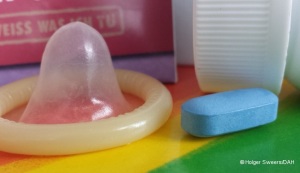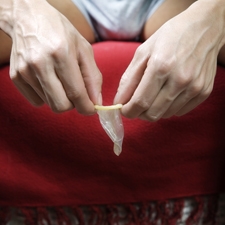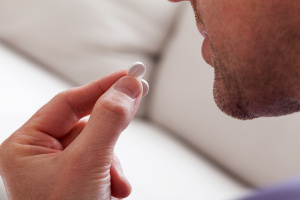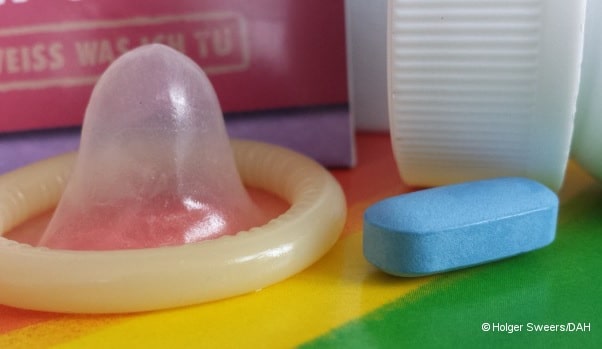HIV-PrEP is sometimes the subject of highly emotional debate among gay men. It is also about sexual pleasure, sex with and without a condom, morality - and stigmatisation. A contribution by Holger Sweers from Deutsche AIDS-Hilfe.

Condoms offer effective protection against HIV transmission, and we know that many gay men use condoms consistently. But we also know that many don't always succeed - and that some can't or don't want to*.
One would think that an addition to the prevention "toolbox" - such as PrEP - would be welcome. But many are sceptical, and some are completely opposed to "pre-exposure prophylaxis", in which HIV-negative people take HIV medication to protect themselves from contracting HIV. The tone of the debate is not always objective, and there is no shortage of personal attacks and an often moralising undertone: something similar could be observed with the introduction of the contraceptive pill as well as with the long-lasting resistance to the message that a well-functioning HIV therapy reliably protects against HIV transmission during sex without a condom.
The form of the debate therefore indicates that it is not just about the rational aspects, but about more: about the taboo of "gay condomless sex" and about gay lust. Some voices, perspectives and arguments:
Len Tooleya young HIV-negative gay man who works in HIV prevention in Toronto, has decided to take PrEP. "I know that if I'm infected with HIV, the world doesn't have to fall apart anymore," he said in an interview in 2013. "But I also know that it's probably easier and better for my body overall to stay HIV-negative."
The "HIV professional" Tooley freely admits that he did not always use condoms consistently. They were "not an invisible barrier", but had an effect on the quality of his sex life. And after risky situations, he always worried a lot, felt guilty and ashamed. PrEP now offers him additional protection and takes away the constant fear of HIV that was previously present. He also sees his PrEP as a contribution to reducing the fear that HIV-positive people often have of infecting their partners and making it easier for positive people to disclose their HIV status. And regarding the (potential) side effects of Truvada, in particular the possible long-term impairment of kidney function, he says: "It is probably better for me to take Truvada for as long as I feel I am at risk of HIV than to become infected and have to take medication for the rest of my life.

Damon Jacobs reducing fears is also very important for PrEP users. The gay therapist spoke to many gay men about HIV when looking for test subjects for a vaccine trial. For years, the alternative had been "condoms or death", and the fear of HIV and AIDS had led to depression, suicides, drug problems and hatred of homosexuals. HIV-PrEP is now changing this belief system, and the factors of sexual satisfaction and pleasure must be given back their right - for some, for example, ingesting sperm while fucking is very important. Jacobs at least draws the following conclusion: 'We need to spread the word that PrEP can protect, because many people don't even know that yet and otherwise we are depriving them of a means of protection.
Michael Bouldinborn in 1970 and HIV-positive, has a similar view. "If PrEP had been available ten years ago, I wouldn't have got infected," he says. Sexual pleasure is also very important to him. He remembers sex parties in New York where sex finally felt natural and right to him. He grew up with safer sex, but at some point he made a conscious decision not to use a condom. His fear of Aids was then damaged - by something much stronger: lust for the male body. And the next "line of defence" was soon dropped: He let a partner cum inside him because he wanted pleasure, intimacy and closeness.
For Larry Kramerthe Aids veteran and co-founder of Gay Men's Health Crisis (GMHC) and ACT UP, this seems to almost border on "betrayal" - of a generation that lost friends, partners, colleagues and lovers to Aids, that fought for gay rights and set up prevention programmes. In an interview with the New York Times, he said: "To me, it's kind of cowardly to take Truvada instead of using a condom. You're taking a drug that's poison for you, and it reduces your energy for fighting, for getting involved, for doing anything."
Bouldin, on the other hand, points out that the use of the contraceptive condom was a self-determined emergency measure introduced by gay men and was not intended to be permanent. The fear of HIV has diminished - the return of "natural" (condomless) gay sex can no longer stop it, but it can push the discussion about it underground, where prevention no longer belongs.
Nicholas Feustel, a German HIV activist, sees PrEP as another option alongside condoms and is in favour of healthcare systems making it available. The main target group for PrEP is people who do not use condoms or do not always use them during sex, for example because they would otherwise not get a hard-on or lose it again, or because they want to be very close to their partner. However, the reason is ultimately irrelevant and should not be judged morally, but must be accepted, says Feustel. You can't reach these people with the condom message, but you can reach them with PrEP - and those who get on well with condoms should stick with them. The frequently internalised stigma that those who do not use condoms are "bad" or "fail" can be dispelled, however, because PrEP allows you to take care of yourself in a different way than condoms.

The blogger Rich Juzwiakhimself a PrEP user, sees not only the direct protective effect of PrEP, but also a positive influence on prevention: it means that (gay) sexuality is finally being talked about again. In addition, Truvada destigmatises HIV-negative people by giving them something like the HIV experience, but without HIV - the cultural gap between positive and negative people is closed.
The HIV activist sees things differently Ulli Würdemann. He asks whether PrEP does not perpetuate a central image of the "old AIDS" and thus perpetuate the HIV stigma: "If I am supposed to take pills without even being ill, I need a motivational structure. In this case: an infection with HIV is the worst thing that can happen to you in life. You better be afraid of it and do everything you can to prevent it from happening."
Outrage was caused by Michael Weinsteinfounder and head of the world's largest AIDS NGO, the AIDS Healthcare Foundation, who described Truvada as a "party drug". Weinstein opposes the promotion of PrEP as a public health measure - he does not doubt that it works in individual cases if it is taken consistently. His main criticism is levelled at what he considers to be the embellished data on the protective effect, which can only be achieved in studies with highly motivated individuals. The AHF President is convinced that treatment compliance will not be achieved in everyday life. He also sees the danger that gay men will stop using condoms because of PrEP and that this will increase the number of infections with HIV and other sexually transmitted pathogens in the long term.
Greg Mitchell summarised this on thegayuk.com as follows: "I think the resistance to PrEP can be traced back to the fact that we are ashamed of our desire for condomless sex." Many opponents of the introduction of PrEP are apparently of the mistaken opinion that gay men who test positive for HIV are the "dirty gays" who go to sex parties at the weekend and take drugs (and therefore somehow "deserve" the infection). The "good gays", on the other hand, are apparently those who conform to the heterosexual norm, meet the man of their dreams and then live monogamously. "But many of these 'good gays' also get positive test results," says Mitchell. "So maybe we should all stop judging others - and just embrace the medical progress that PrEP has brought us."
A good final word! More on PrEP soon in part 3 of the debate.
*See "Schwule Männer und HIV/AIDS: Lebensstile, Sex, Schutz und Risikoverhalten 2010" Michael Bochow et al; p. 80 ff.










